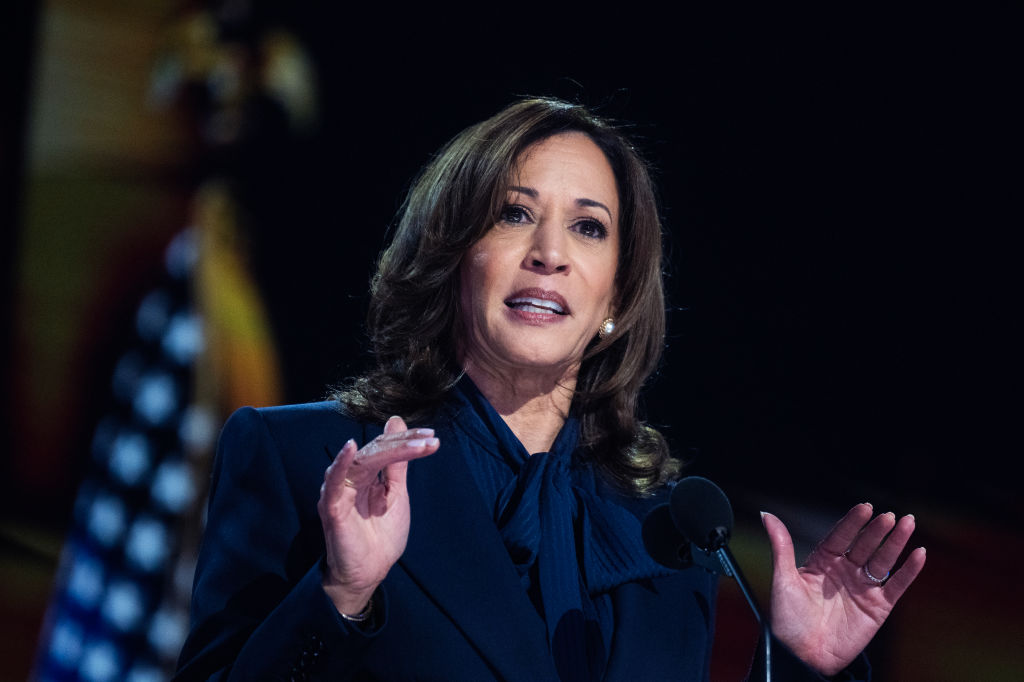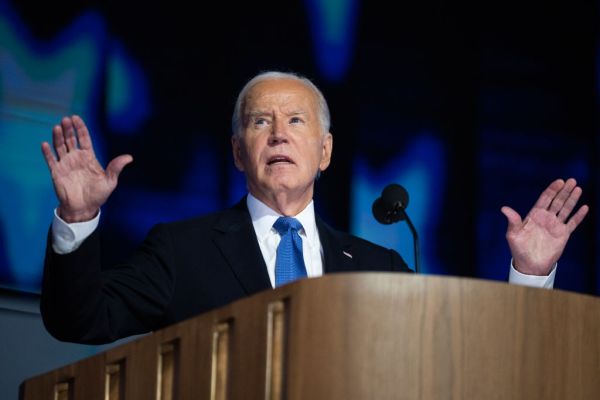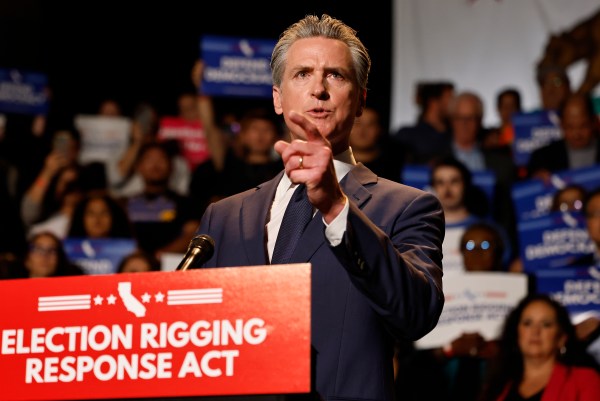Vice President Kamala Harris formally accepted her party’s nomination for the presidency Thursday night, discussed policies she would implement were she to win, and criticized her opponent, former President Donald Trump. Harris made several misleading claims on issues of tax policy and spending, the Supreme Court’s ruling on presidential immunity, and abortion restrictions.
The cost of tax cuts.
Harris contended that Trump has proposed tax cuts that would cost a total of $5 trillion. “He doesn’t actually fight for the middle class,” Harris said. “Instead, he fights for himself and his billionaire friends. And he will give them another round of tax breaks that will add up to $5 trillion to the national debt.”
This claim is partially true but missing context. Trump has advocated for extending the Tax Cuts and Jobs Act (TCJA) his administration passed in 2017 and that is set to expire in 2025. According to an analysis from the Congressional Budget Office, extending tax provisions in the TCJA would cost approximately $4.6 trillion, including interest, over the next decade. Similarly, the Committee for a Responsible Federal Budget—a nonpartisan, nonprofit fiscal policy think tank—projected TCJA extensions would cost $4.5 trillion over the next decade.
However, those tax breaks do not apply exclusively to billionaires or high-income earners, but apply to individuals across various income levels. The projections also include costs from extending estate, business, and other TCJA provisions—not just those for individual taxpayers.
Harris also claimed that Trump’s domestic policies would raise prices for middle-class families by nearly $4,000. “He intends to enact what, in effect, is a national sales tax,” Harris said. “Call it a Trump tax that would raise prices on middle-class families by almost $4,000 a year.”
This claim is mostly true but lacking some context. The policy proposal Harris refers to is Trump’s tariff agenda, specifically his proposal to impose a 10 percent tariff on all foreign goods, with a special 60 percent tariff on all goods imported from China. While Trump’s tariff policy effectively makes those foreign goods—and sometimes even domestic goods—more expensive—that is not the same thing as a national sales tax.
Tax policy researchers agree that Trump’s tariff plans would raise prices for American families, but by how much remains in dispute. In February, the National Taxpayer Union’s Bryan Riley calculated that Trump’s tariff agenda, if implemented, would cost the average American household approximately $3,942, based on 2022 import data. However, the Tax Policy Center’s Howard Gleckman estimated earlier this month that the average American household would see extra annual expenses of only $1,800.
Is Trump now immune from criminal prosecution?
Harris emphasized the authority Trump could again wield if returned to the White House. “Consider the power he will have, especially after the United States Supreme Court just ruled that he would be immune from criminal prosecution,” Harris said.
This claim is partially false: In July, the Supreme Court ruled in Trump v. the United States that executive authority partially shields the president from criminal prosecution. The court found that presidents have full immunity when exercising authority explicitly granted to them in the U.S. Constitution, “presumed” immunity for official presidential acts, and no immunity for unofficial acts.
What does this mean in practice? That answer is not fully clear and would likely require further deliberation from the courts. “There is no question that the Supreme Court’s opinion will make it more difficult to prosecute both Donald Trump and future presidents,” Michael Warren and Sarah Isgur wrote in The Collision. “But the question will be how strong this new presumption of immunity is and where the courts draw the line on the ‘outer perimeter’ of a president’s official acts.”
Abortion
Harris also sought to draw a contrast between her agenda and Trump’s on abortion. “As a part of his agenda, he and his allies would limit access to birth control, ban medication abortion and enact a nationwide abortion ban, with or without Congress,” Harris said. “And get this. Get this. He plans to create a national anti-abortion coordinator, and force states to report on women’s miscarriages and abortions.”
These claims are partially false and missing context. Since securing the nomination, Trump has expressed opposition to federal restrictions on birth control, said that he would keep medication abortion legal, and refused to endorse a federal abortion ban.
However, Project 2025—a policy blueprint put together by the Heritage Foundation and other conservative think-tank organizations for a potential incoming GOP administration–-includes sections that call for the Food and Drug Administration to rescind approval for both a specific type of emergency birth control—ulipristal acetate—and for the abortion drug mifepristone, especially after 50 days of gestation. Project 2025 does not call for a federal abortion ban, as we noted in an earlier Dispatch Fact Check.
While rescinding FDA approval would not require congressional authorization, there is no constitutional method to implement a federal abortion ban without Congress—and some legal scholars have doubted such a law would be constitutional, even with congressional approval.
Trump has repeatedly disavowed the Project 2025 blueprint, as recently as Thursday night after Harris’ speech. “LYING AGAIN ABOUT PROJECT 2025, WHICH SHE KNOWS, AND SO DO ALL DEMOCRATS, THAT I HAVE ABSOLUTELY NOTHING TO DO WITH!” Trump posted on social media.
Harris’ claim that Trump wants to install a “national anti-abortion coordinator” and mandate a miscarriage and abortion state reporting system is similarly missing context: Neither policy comes from Trump or his presidential campaign, but from Project 2025.
While Project 2025 makes no mention of a “national anti-aboriton coordinator,” it does advocate for replacing the Department of Health and Human Services’ Reproductive Healthcare Access Task Force with a pro-life task force intended “to promote the life and health of women and their unborn children.” Additionally, the project calls for the creation of a “Special Representative for Domestic Women’s Health” position in the administration who “would provide a clear focal point for all issues related to protecting life and serving families.”
Project 2025 also advocates revamping the Centers for Disease Control and Prevention (CDC) reporting systems, including a mandated state reporting system for miscarriages and abortions, information it deems “essential to timely, reliable public health and policy analysis.”
The CDC has been reporting abortion data since 1969, although states are not required to send abortion numbers to the federal agency but do so voluntarily. Some states choose to not report their abortion statistics to the CDC. California, Maryland, New Hampshire, and New Jersey opted not to report in 2021, the latest abortion surveillance report published by the agency.
Project 2025 calls for a substantial upheaval of the reporting program. “Because liberal states have now become sanctuaries for abortion tourism, HHS should use every available tool, including the cutting of funds, to ensure that every state reports exactly how many abortions take place within its borders, at what gestational age of the child, for what reason, the mother’s state of residence, and by what method,” Project 2025 proposed.
If you have a claim you would like to see us fact check, please send us an email at factcheck@thedispatch.com. If you would like to suggest a correction to this piece or any other Dispatch article, please email corrections@thedispatch.com.










Please note that we at The Dispatch hold ourselves, our work, and our commenters to a higher standard than other places on the internet. We welcome comments that foster genuine debate or discussion—including comments critical of us or our work—but responses that include ad hominem attacks on fellow Dispatch members or are intended to stoke fear and anger may be moderated.
With your membership, you only have the ability to comment on The Morning Dispatch articles. Consider upgrading to join the conversation everywhere.